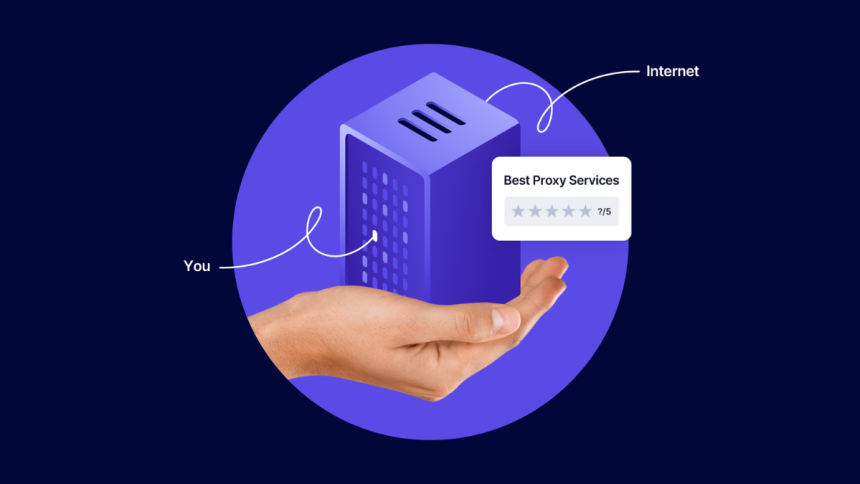“Data-driven decisions” is a buzzword that’s all the rage in today’s business world. And for those decisions, massive amounts of data are required.
Perhaps the best tool to use in this case are proxies. However, there are hundreds of proxy providers out there, but we are here to help. Take note of these proxy service providers and make your 2025 completely data-driven!
#1: IPRoyal
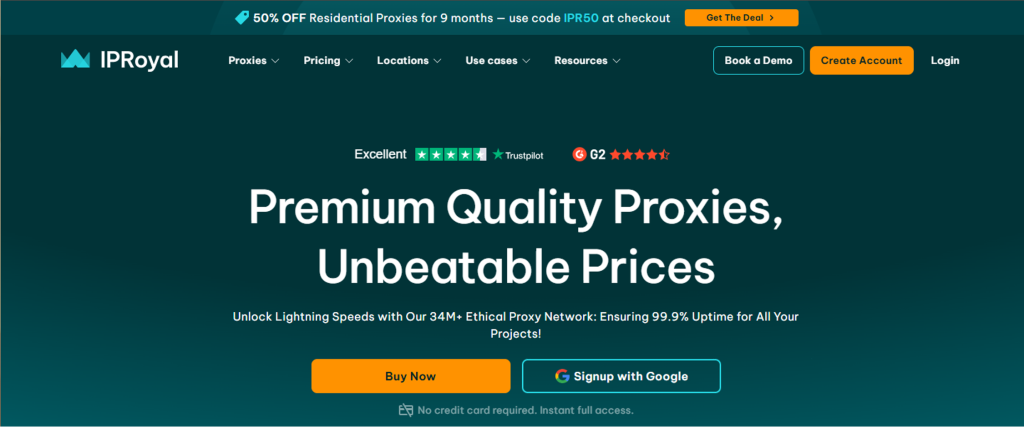
What’s right is right – IPRoyal does not lie about their services. As noted on the front page, they offer premium quality proxies at, arguably, bargain pricing. They offer residential, ISP, datacenter, and mobile proxies – all with extensive amounts of IP addresses.
Take, for example, residential proxies – the pool for these proxies is over 32 million. Not only is it huge, but every single IP is ethically sourced. This is achieved via their passive income solution called Pawns.app. People knowingly install their application, share their IP address, and get paid for the traffic.
When it comes to pricing, considering the quality provided, they are pretty competitive. Residential proxies start at a mere price of $1.75 per GB, whereas ISP ones start at just $2.40 per proxy. This not only enables you to scale your operations with barely any cost increases, but also offers a way to experiment with different solutions at a fraction of the cost.
Finally, if something does not work out as expected, IPRoyal offers 24/7 support for any needs whatsoever. When all these qualities are taken into account, IPRoyal does stand out as the leader in today’s proxy market. If you have any doubts on which proxy provider to choose, look no further than this one.
Pros:
- Large residential IP pool with global coverage
- Non-expiring residential proxy traffic
- Customizable plans with bulk discounts
- Country, state, and city targeting
Cons:
- Free trial only for businesses
- Country-level targeting for mobile proxies
#2 MarsProxies
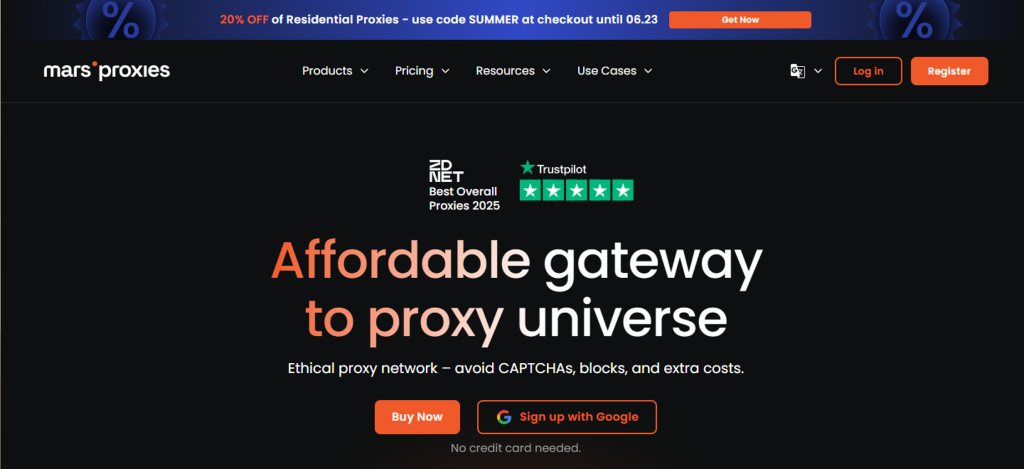
Something new does not mean something bad. MarsProxies could be the case and point here. A relatively new player in the field of proxies, it is sure on the way to establish itself as a major player.
Perfectly suited for individuals and small-to-mid-sized businesses, MarsProxies keep the ratio of quality and pricing almost perfect. This proxy provider offers residential proxies, datacenter proxies, ISP proxies, mobile proxies, and, uniquely, sneaker proxies and IPv6 datacenter proxies. Oh, and they have already won the title of “Best Overall Proxies 2025” from ZDNET.
Understandably, since it is a rather new company, the IP pool size is not as large as the ones from more established players, but that is a weak point that will surely be resolved in the future as the company grows.
On the brighter side of things, being new means better prices for you. MarsProxies residential IPs start at $3.49 per GB, and datacenter proxies are offered at a starting price of $0.89 per proxy. Besides that, the plans offered are ridiculously flexible and can be catered to any needs.
Pros:
- Affordable plans for individuals and SMBs
- Complete proxy coverage with HTTP(S) and SOCKS5 support
- Non-expiring residential proxy traffic
- Excellent 24/7 support
Cons:
- Somewhat limited IP pool
- No free trial available
#3 Storm Proxies
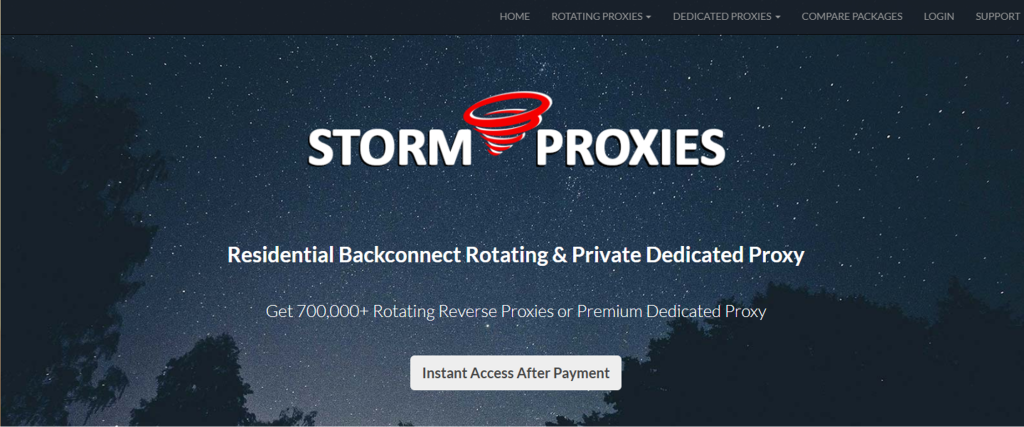
If speed is what you need, look no further than Storm Proxies. This proxy provider offers a network of over 700,000 proxies that work with breakneck speeds (1Gbps network). While the number of IPs at their disposal is not huge, they more than make up for it with the aforementioned speed.
Besides that, other than regular proxy types (residential, shared datacenter, and dedicated datacenter), they offer proxies that are specialized for ticket sales websites, most notably Ticketmaster. And, in a similar vein to MarsProxies, they have proxies that are built for sneaker markets as well.
The prices could be a little bit better as they start at $6 per port on residential proxies, but, as noted, the speed is key here, and this pricing is well worth it if speed is your key. Also, the bandwidth is unlimited and the support is there to help you 24/7 in case anything crashes.
Simply put, Storm Proxies is a great option for individual users who are keen to be first in various drops, be it sneakers or tickets. Businesses may also go for it, but overall, it’s a better service for speedy, smaller users.
Pros:
- Specialized proxies for sneakers, tickets, social media
- Competitive pricing for individuals and small businesses
- Easy setup and 24/7 support
Cons:
- Fairly small proxy pool
- Limited geographic coverage
#4 Bright Data
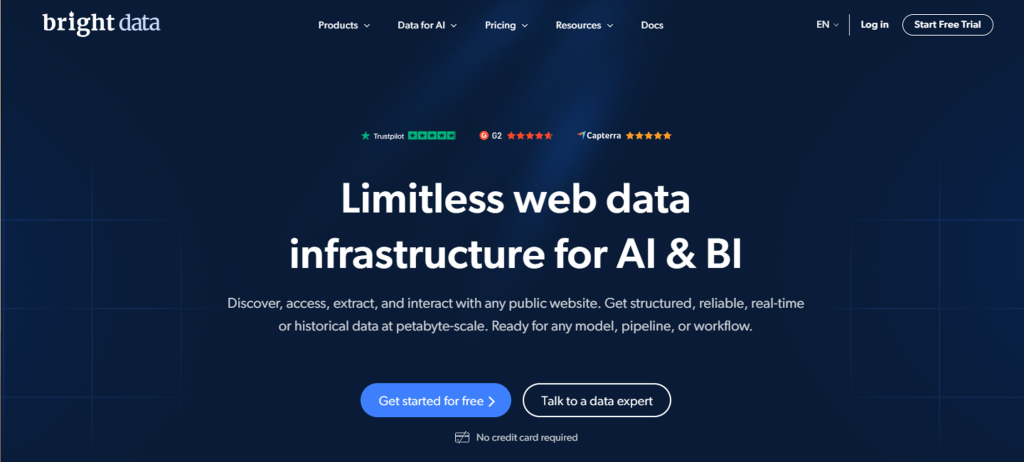
One of the most well-known proxy providers on the market, Bright Data boasts incredibly large pools of proxies and has established itself as a major player in the proxy field.
They offer proxies scattered all over the world, split into rather traditional types: residential, mobile, datacenter, and ISP ones. The IP address count stands at a staggering 150+ million, with almost 5.5 million in the United States alone.
When it comes to pricing, it becomes clear that Bright Data is clearly focused on business-to-business (B2B) solutions. Yes, they do offer a pay-as-you-go solution for residential proxies, but their cheapest plan with set pricing starts at $499 per month. While it does include 138 GB of bandwidth, the price is steep, especially for individual users or small-to-mid-sized businesses.
In the end, it is a very well-known service, but it surely is not for everyone, mostly due to pricing.
Pros:
- Large global proxy pool
- Advanced web scraping tools
- Structured datasets available
Cons:
- Higher costs than other providers
- Steep learning curve
#5 NetNut
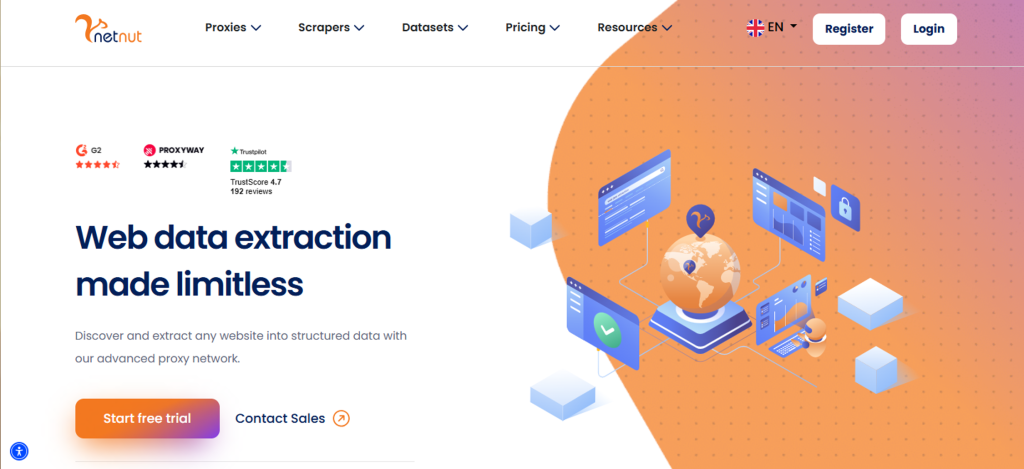
NetNut is a proxy provider that’s well-known for its stability and high speeds. Similar to other providers, it offers all the traditional proxy types (rotating residential proxies, static residential proxies, mobile proxies, and datacenter proxies) as well as the most used protocols, such as HTTP, HTTPS, and SOCKS5.
The pool sizes are respectable, as the rotating residential proxy pool stands at over 85 million proxies scattered over 195 countries. Static residential proxies, however, could do a better job, as the pool contains only over a million IPs.
While NetNut offers amazing speeds, global coverage, great stability, and prompt support, its downside is the service’s cost. The price for a monthly plan of rotating residential proxies (72GB plan) comes down to $249 per month. It is a steep price, especially for smaller-sized businesses or individuals alike.
NetNut is a solution for those who know exactly what they need, since the cost of a mistake is far from marginal here.
Pros:
- Large residential proxy pool
- Precise geo-targeting (down to city/state)
- User-friendly dashboard
Cons:
- No pay-as-you-go pricing
- Small static residential proxy pool
Final Thoughts
All in all, while there are hundreds of proxy providers around the internet, don’t make your head spin and go for the best ones outlined here. Whether you are a small business, an enterprise, or just an individual in need of proxies, you have multiple choices, each catered to your needs.
Lynn Martelli is an editor at Readability. She received her MFA in Creative Writing from Antioch University and has worked as an editor for over 10 years. Lynn has edited a wide variety of books, including fiction, non-fiction, memoirs, and more. In her free time, Lynn enjoys reading, writing, and spending time with her family and friends.


